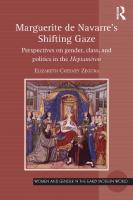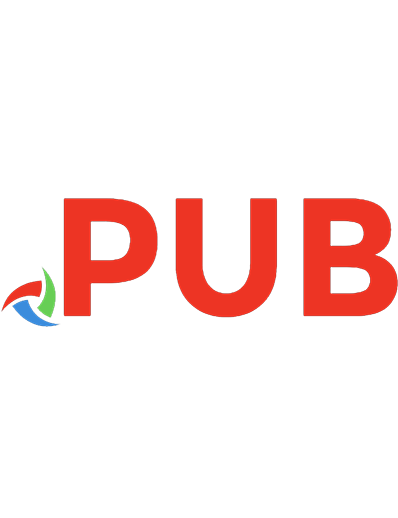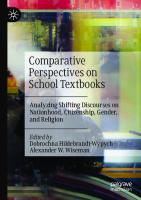Comparative Perspectives on School Textbooks: Analyzing Shifting Discourses on Nationhood, Citizenship, Gender, and Religion 303068718X, 9783030687182
This book examines the discourses on nation-building, civic identity, minorities, and the formation of religious identit
114 106 9MB
English Pages 393 [378] Year 2021
Polecaj historie
Table of contents :
Preface
Contents
Notes on Contributors
List of Figures
List of Tables
1 Introduction: Contrasting Perspectives on School Textbook Development and Discourse Worldwide
Intersectionality and Isomorphism Reflected in Textbook Content
Concluding Remarks
References
Part I The Role of School Textbooks in Developing Nationhood
2 “Swedish” Values and Norms in Language Courses and Social Orientation for Adult Migrants in Sweden: A Critical Analysis of Teaching Materials and Education Since the 1960s
Introduction
Theoretical and Methodological Points of Departure Including Empirical Data
Views on Work and Education in Policy and Textbooks: Discursive Texts of Their Time
Textbooks from the 1960s: An Active Working Life
The 1970s and 1980s: The Welfare Consumer
The Model of the 1990s: Learn How to Learn!
From the 2000s: More Outspoken Discourses on “Work Strategy”
Gender Issues/Gender Regime in Policy and Textbooks
Early Gender Regimes in SFI: Documents and Textbooks from the 1980s Until 2000
Gender Regimes in the Book About Sweden for Civic Orientation
Concluding Remarks
References
3 Citizenship and Nationhood in Black and White: Silences of Slavery in Textbooks
Introduction
Historical Context of the Transatlantic Trade
Sources and Analysis
Summary of Main Trends
Context of Multiple Slaveries
Who Were the Traders
Citizenship and Nationhood in Black and White
Ghana, Namibia, and South Africa
Australia, England, and Scotland
Conclusion
References
4 Books Have Their Own Stories: LGBTQ+ History in U.S. History Textbooks, 1990–2015
Book Analysis Process
Textbooks Tell Many Tales
A Diverse Group
A Title Speaks Volumes
The Significance of the Audience
Changing with the Times?
Moving onto the Next Chapter
Conclusion
References
5 Nation and Gender in Polish and Czech School Textbooks
Introduction
The Method
Research Questions and Main Findings
Construct of Community and “Others”
Unique Features in Polish Textbooks
Unique Features in Czech Textbooks
Others
The Construct of Gender
Conclusions
References
Part II Creating Citizenship through School Textbooks
6 Citizenship Education in Recent Polish and Chilean History Textbooks: A Comparative Perspective
Theoretical Framework
Methodology
Sample
Categories
Findings
Discussion
Conclusions
References
7 Shaping Civic Attitudes in Civic Education Textbooks in Poland: Globalization Processes and Fragmentation of Reality
Building a Civil Society in Poland
School Textbooks as Part of the Curriculum
Student Self-Government, Civic Participation, and Civic Education Textbooks
Citizenship in School Textbooks in the Context of Globalization Processes and International Integration
Patriotism and Ethnic Minorities in School Textbooks
Summary
References
8 Neoliberalism and Citizenship Education: Critical Discourse Analysis of Citizenship Education Textbooks in Public Secondary Education in Canada (Ontario) and Poland
Theoretical Basis
Materials and Methods
The Results of the Core Curriculum Analysis
The Results of Textbook Analysis
The Notion of a “Citizen”: Poland
The Notion of a “Citizen”: Canada
Differences and Similarities Between Polish and Canadian Textbooks
Conclusion
Appendix
Ontario, Canada
Poland
References
Part III The Complexity of Gender Through the Lens of School Textbooks
9 “Deleted–Repeated” or Textbook Strategies for Telling the History of Women’s Emancipation in the Time of Educational Change in Poland
Introduction
Microanalysis
Women’s Emancipation Movement in Middle School Textbooks
Women Right to Education
World War I
Comparative Analysis
Summary
References
10 Mothers and Soldiers: Gendered Citizenship Education in Post-War Sri Lankan Textbooks
The Sri Lankan Context
Methodology and Analysis
Findings
Sinhalizing and Masculinizing Citizenship
The Patriarchal Family
The Benevolent Father and the Patriarchal State
Gendering and Militarizing Civic Engagement
Discussion
References
Part IV Religion and Culture in School Textbooks
11 Contrasting Images of Islam and Arab Societies in Western Secondary Textbooks
Introduction
Theoretical Framework and Questions
Data and Methodology
Images of Islam and Arab Societies
Historical Drawings and Artwork
Maps
Political Cartoons
“Call Out” Boxes
Photographs
Conclusion
References
12 Portrayal of Religion Against the Backdrop of Progress and Modernity in the US and Canadian Social Science Textbooks from 1850 to 2010
Introduction
Literature Review
Christianity in Canada and the United States
Christianity in Nineteenth-Century Textbooks
Christianity in Twentieth-Century Textbooks
Data
Findings
Discussion and Conclusion
References
13 Religiously Framed Nation-Talk in Polish History Textbooks: John Paul II. and St. Jadwiga as National Heroes
Introduction: National Heroes as Secular and Religious Constructs—Religion and Nationalism Intertwined
School Historical Narrative
Catholicism, Messianism and National Identity in Poland
Data Gathering and Analysis
Finding 1: The Discourse of Sainthood (in the National Context)
Finding 2: The Discourse of Power
Finding 3: The Discourse of Christian-Based National Integrity (Common Culture)
Concluding Remarks
References
14 Education, Literature, and Social Phenomena in the Age of Globalization
Pro-development and Active Participation in the Processes of Change
Proactivity as Undertaking Actions Aiming at Change
Final Remarks
References
Part V Conclusion
15 The Shift from Hegemonic Agenda-Setting to Normative Discourse Formation in School Textbooks Worldwide
Comparing Exogenous and Endogenous Factors in Textbook Analysis
Normative Discourse in Textbooks Worldwide
References
Index
Citation preview
Comparative Perspectives on School Textbooks Analyzing Shifting Discourses on Nationhood, Citizenship, Gender, and Religion Edited by Dobrochna Hildebrandt-Wypych · Alexander W. Wiseman
Comparative Perspectives on School Textbooks
Dobrochna Hildebrandt-Wypych · Alexander W. Wiseman Editors
Comparative Perspectives on School Textbooks Analyzing Shifting Discourses on Nationhood, Citizenship, Gender, and Religion
Editors Dobrochna Hildebrandt-Wypych Faculty of Educational Studies Adam Mickiewicz University in Poznan´ Poznan, ´ Poland
Alexander W. Wiseman Educational Psychology and Leadership Texas Tech University Lubbock, TX, USA
ISBN 978-3-030-68718-2 ISBN 978-3-030-68719-9 (eBook) https://doi.org/10.1007/978-3-030-68719-9 © The Editor(s) (if applicable) and The Author(s), under exclusive license to Springer Nature Switzerland AG 2021 This work is subject to copyright. All rights are solely and exclusively licensed by the Publisher, whether the whole or part of the material is concerned, specifically the rights of translation, reprinting, reuse of illustrations, recitation, broadcasting, reproduction on microfilms or in any other physical way, and transmission or information storage and retrieval, electronic adaptation, computer software, or by similar or dissimilar methodology now known or hereafter developed. The use of general descriptive names, registered names, trademarks, service marks, etc. in this publication does not imply, even in the absence of a specific statement, that such names are exempt from the relevant protective laws and regulations and therefore free for general use. The publisher, the authors and the editors are safe to assume that the advice and information in this book are believed to be true and accurate at the date of publication. Neither the publisher nor the authors or the editors give a warranty, expressed or implied, with respect to the material contained herein or for any errors or omissions that may have been made. The publisher remains neutral with regard to jurisdictional claims in published maps and institutional affiliations. Cover illustration: © Alex Linch/shutterstock.com This Palgrave Macmillan imprint is published by the registered company Springer Nature Switzerland AG The registered company address is: Gewerbestrasse 11, 6330 Cham, Switzerland
Preface
The volume Comparative Perspectives on Textbook Analysis: Analyzing Shaping Discourses on Nationhood, Citizenship, Gender, and Religion investigates the discourses on nation-building, civic identity, gendering strategies, and the formation of religious identities in school textbooks worldwide. The selection of those four key perspectives for the comparative examination is based on the idea these four themes assert an immense influence on educational policies of all educational systems worldwide. Although their ideological goals may differ substantially, the question of shaping members of a national group, within a particular citizenship ideal, and with socially expected gender or religious identities, remains the fundamental aim of every educational system within its socialization function. Furthermore, nationhood, citizenship, gender, and religion are—due to its ideological interconnectedness and sensitivity to social change—especially relevant dimensions of continuity and change in the area of textbook content and textbook production. The understanding of how these four perspectives—nationhood, citizenship, gender, and religion—are anchored in textbook content and curricular aims, may shed light on the similarities and differences between educational policies globally. It may also improve our chances to understand never-ending battles over equity in education, and counteract against the ideological abuse of textbooks and their instrumentalization for political conflict. A general tendency to absolutize the dominant groups’ national, religious, or gender position, as well as the increasing tendency to reject cultural v
vi
PREFACE
and religious minorities should be understood also as a threat to the fair and socially just textbook content. Not regarding textbooks knowledge as monolithic, but rather as a result of multiplicity of practices and interests seems a necessary condition for educating students who are able to respect other positions, even in disagreement. The volume offers a selection of qualitative and mixed method textbook and curriculum analyses, as well as the broader context of critical textbook and curriculum analyses in and across selected countries. The volume offers unique and empirical research on how internal educational policies and ideological goals of dominant social, political, and economic groups affect textbook production and the curricular aims in different educational systems worldwide. Textbook analyses often raise important issues on the venues as well as challenges of representing the politically legitimized knowledge of “weaker” groups in society, including women and religious or ethnic minorities. The analysis of dominant views on the place of socially marginalized social groups in textbook narratives and curricular objectives play an important role in both policy development and the actual education of youth worldwide. School textbook analysis is also increasingly relevant to education policy and practice as many nations see divisions among social, political, and economic groups grow wider in the early twenty-first century (Fuchs, & Bock, 2018). Textbook content and production analyzed in this book serves to identify and examine not only any long-term dominant state ideology that exists, but also the associated political situations within and across specific countries. The worldwide increase of right-wing extremism, populism, and hostility to immigrants and other minorities, especially following an era in the late twentieth and early twenty-first centuries of civil war, internal displacement, and refugee migration (Wiseman et al., 2019) makes understanding textbook discourses around national identity, nation-building, gender issues, and civic education especially relevant for both educational research and practice. Global culture also plays a significant role in influencing both the evolution of and rapid shifts in national identity, nation-state politics, and education’s civic contribution to both, especially when civic, social, and economic boundaries related to ethnicity and gender roles are concerned (Jimenez et al., 2017; Zajda, 2017). The bond between citizens and nations that developed over the course of the twentieth century has already begun and will continue to evolve as individuals and communities increasingly realize that their countries are becoming less and less
PREFACE
vii
monolingual, monocultural, and monoethnic (Giordano, 2019). With the transformation of the twentieth century model of nation/citizen (e.g., Balta, & Altan-Olcay, 2016), the goals and functions of education (including textbook production) are designed differently in and across national education systems. More cosmopolitan outlooks are added to nationalistic orientations and vice versa (Jefferess, 2016). For example, new social ontologies (e.g., human rights discourses in education) challenge the traditional standing of nation-states and the prescribed roles of minority groups in it (Bajaj, 2017). As individuals are increasingly empowered (or isolated from one another), the monopoly of political elites in controlling public agendas and determining what constitutes legitimized knowledge may decline (Platt, 2018). This is one of many changes in the broader struggle over establishing excellence and equity in education, which textbooks reflect more explicitly and measurably than policies, practices, or other artifacts of educational systems. In fact, as a counterweight, these ontological changes cause a growing feeling of uncertainty and loss of attachment to what some groups call the “safe harbor” of a common national culture and common knowledge (e.g., Bloom, 1994). As societies polarize and there often occurs a sense of alienation, or even a sense of living in the world dominated by "foreign" discourses, among different groups within those societies. Under these kinds of circumstances, school textbooks have historically served as tools for controlling the introduction of nation-state ideology and organizing social identities around collective interests (Nasser, 2004; Mustafa, & Cullingford, 2008). They also indicate a space (or lack of space) for narratives of national, ethnic, or sexual minorities, limiting these identities that threaten collective purposes with or across groups in any given society. The writing and approval of textbooks, especially in such subjects as history and civic education have always been influenced by or subject to government control (Schissler, & Soysal, 2005). However, as a result of democratization, educational expansion and the spread of human rights discourses, twenty-first century national education policies are becoming more inclusive than the traditional twentieth-century models (Williams, 2014). When there is conflict over traditional notions of social, political, or economic identities, textbooks become a source of contentiousness as well. It is often claimed that textbooks are unable to effectively deal with social and cultural diversity, serving primarily the interests of culturally uniform nation-states (Baquès, 2006). Likewise, textbooks are often seen
viii
PREFACE
as not only inadequate in keeping up with social change, but also counteracting these transformations in the name of social solidarity and cohesion. Education systems are constrained by the legacy of traditional pedagogical practices, as well as past political influences, and textbooks both provide an historical trail of those changes as well as serve as instruments for either voicing or influencing not only what is considered legitimate knowledge within those eras but also acting as agents of change swaying what generations of youth think and believe. The authors in this volume focus primarily on ways that textbooksdiscourses evolve and change, but also on the politics of the textbooks by recognizing how—via the selection and organization of “official knowledge”—key discourses constitute a particular construction of past and present events. Questions addressed in this volume’s chapters include the following: How are our national histories presented? How do textbooks depict the experiences of ethnic or sexual minorities? What is the narrative content of so-called “good citizenship”? In order to provoke an informative discussion on the role of textbooks in transmitting legitimized knowledge, this volume refers to Raymond Williams’s (1973) idea of selective tradition. From the more critical theoretical perspectives of reproduction and cultural hegemony, textbooks reproduce dominant ideologies based on “the selective tradition,” meaning “the significant past,” “which, within the terms of an effective dominant culture, is always passed off as >>the tradition
![Origin Stories in Political Thought : Discourses on Gender, Power, and Citizenship [1 ed.]
9781442678149, 9780802088123](https://dokumen.pub/img/200x200/origin-stories-in-political-thought-discourses-on-gender-power-and-citizenship-1nbsped-9781442678149-9780802088123.jpg)

![Shifting Visions : Gender and Discourses [1 ed.]
9781443875172, 9781443871877](https://dokumen.pub/img/200x200/shifting-visions-gender-and-discourses-1nbsped-9781443875172-9781443871877.jpg)







